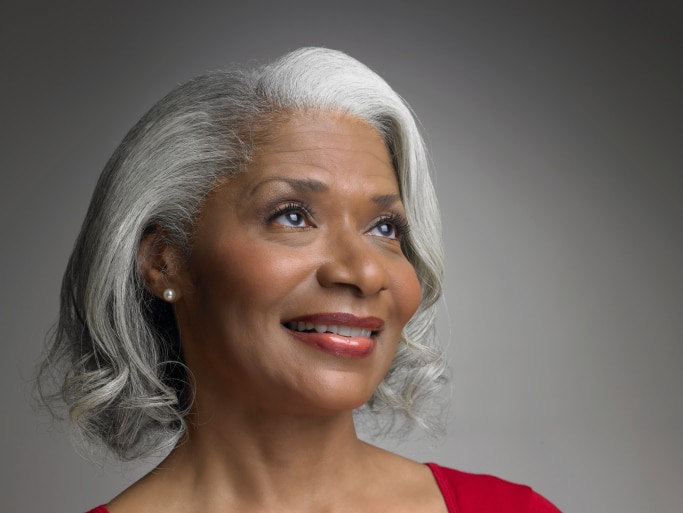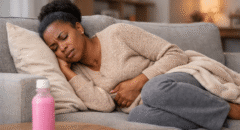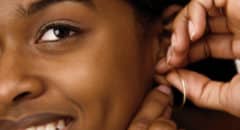 For many men and women, our hair is a pain point when it comes to vanity. It can really make or break how you feel about yourself on the outside, which then can translate into how you feel about yourself on the inside.
For many men and women, our hair is a pain point when it comes to vanity. It can really make or break how you feel about yourself on the outside, which then can translate into how you feel about yourself on the inside.
Graying heads is something that many of us concern ourselves with as we get older, and truth be told, it's been on my mind since I was a kid.
Being a naturally red headed girl I see gray hairs all the time! It's such a shame though that media has lead us to feel that we can't embrace this as just another natural aspect of life. It isn't negative, it isn't a sign of being outdated, unattractive or lazy. Many beauty companies who sell hair coloring products market towards people with graying hair, making them think that the right way to adjust to the change in their bodies is to "fix it".
MUST READ: 10 Things I'm Personally Tired Of Hearing About Natural Hair
I say we stop trying to appease society's view of beauty and we do what makes us feel good. Embrace your beautiful gray locks of hair if you have them, and just try to understand why it happens to the majority of us at some point and that some of the things we are told about gray hair is simply just a myth.
1. Aging
A healthy individual has anywhere from 100-200k hair follicles on their head. According to the Government's Library of Congress site, The melanin in our bodies is what gives both our skin and our hair its pigment. As we grow older your body doesn't work as efficiently, often making it more difficult for the hair follicles to access the melanin. This in turn makes your hair grow out white, gray, and/or silver. Another study published in the New York Times, suggests that a build up of hydrogen peroxide in the hair cells can cause a natural bleaching process. They explain that the catalase enzyme is what regulates the hydrogen peroxide levels in our bodies. Over time our bodies again begin to become less effective in some ways, and ultimately catalase is something we begin producing less of. Eventually because of the hydrogen peroxide builds up and blocks "he normal synthesis of melanin, the natural pigment in hair. Thus the hair turns gray."
2. Heredity
According to the Journal of Investigative Dermatology, a report from 2005 says that, "Whites tend to gray first, often as early as their mid-30s, followed by Asians and then Africans. About half of 50-year-olds are at least 50 percent gray." In general, most doctors live by this 50/50/50 rule which suggests that at age 50, 50% of the population will have 50% gray hair. A more recent worldwide study published in National Institute of Health suggests that in reality these numbers are actually much lower. In fact in some parts of the world research suggests the numbers are as low as 6-23% of people age 50 and over have gray hair.
MUST READ: Is There A Way To Prevent Gray Hair?
3. Hair Removal
Ever heard the old wives tale about plucking your gray hairs makes more come? This is scientifically impossible. The only consequence from hair removal is hair loss. Over time, however, the constant plucking of your hairs can cause damage to the follicles and decreased hair production.
4. Stress
Another often go to is to say that stress is a direct cause of hair loss and discoloration. To date there isn't any hardcore evidence that can directly link the two, but there have been several studies that suggest that stress may play a role in graying hair. Nobel Prize winner Robert Lefkowitz did a study that uncovered that "long-term productions of the body’s fight or flight response—the instinctive ability to mobilize energy in response to a threatening situation—can damage your DNA and cause premature aging, including graying hair."
5. Trauma
The Marie Antoinette Syndrome is often referred to when someone believes that their graying hair came about suddenly and because of the onset of a traumatic situation. Marie Antoinette was said to suddenly have a head full of white hair the night before she was to be beheaded. Science says that this is false. She more than likely removed her wig. Hair that has already grown out can't naturally go gray. You can't go to sleep with dark black hair, and wake up with a head full of white locks. It just doesn't happen like that. The graying process is gradual, though there are some very rare cases where all the hair can fall out, leaving behind discolored or gray hair.
6. Smoking
A 2013 study published on the National Institute of Health's website suggests that there is a significant relationship between smoking and gray hair, especially for people under the age of 30. "Smokers were two and half times more prone to develop PHG” (premature hair graying).
Visit KissTheChaos.com and follow me on Instagram: @Ooolala_laa









